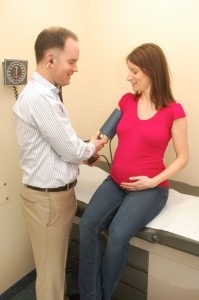
There are multiple options for prenatal screening, depending on your age and personal and family history. If you choose to do prenatal screening, we will work with you to decide which is your most appropriate option. Some choose to have it while others do not. We’ll talk to you about it and help you decide. Here are the main options.
Enhanced First Trimester Screening (eFTS)
Enhanced first trimester screening is a prenatal test that gives early information about your baby’s risk of certain chromosomal conditions: trisomy 21 (Down syndrome), trisomy 18, and trisomy 13. It has two main steps, which are done between 11 and 13+3 weeks of pregnancy:
- A maternal blood test that measures the levels of two proteins: pregnancy-associated plasma protein-A (PAPP-A) and free beta human chorionic gonadotropin (?-hCG)
- An ultrasound exam to measure the size of the clear space in the tissue at the back of your baby’s neck (nuchal translucency).
The results of these procedures and the mother’s age are combined mathematically to provide a numerical estimate of your baby’s chance of having Down syndrome, trisomy 13, or trisomy 18. This estimate is then categorized as either “positive” for the chromosomal conditions or “negative.”
Remember, though, that of the 4 to 5 per cent of women taking the test who screen “positive,” the majority will not be carrying a baby affected with Down syndrome. The test does, however, offer early detection of a possible problem, so you can have time to make decisions about having further diagnostic tests.
NIPT (Non-Invasive Prenatal Testing)
This blood test looks at the fragments of cell-free DNA (cfDNA) circulating in the mother’s blood, taken from the placenta, to gather clues about the genetic profile of your baby. The test can be taken as early as 9 weeks to look for the possible presence of Down syndrome or another chromosome condition (trisomy 13, 18, X, Y and triploidy). It will also tell you the sex of the baby if you wish.
The test uses fetal DNA found the mother’s blood (meaning it only requires a blood draw for mom). It is more accurate than many other prenatal tests in that it flags as having an increased risk 99 per cent of the babies that actually have Down syndrome. It is still only a screening test, however. It cannot tell you for certain whether or not your baby has any of these chromosomal abnormalities.
It is covered by OHIP for certain women who:
- have a positive enhanced first trimester screening;
- are expected to be over the age of 40 when they deliver;
- have previously carried or given birth to a child with a chromosome condition; or
- have ultrasound findings associated with an increased risk for Down syndrome or trisomy 18 or 13.
The test can also be done privately if you wish to pay for it.
Open Neural Tube Defects
NIPT and eFTS do not screen for neural tube defects (NTD). These are abnormalities that occur in the development of the spinal cord and brain of some babies. This is screened for with a detailed ultrasound scan when you are between 18 and 20 weeks pregnant.
Maternal Serum Screening (MSS)
MSS is a maternal blood test for pregnancy related hormones. It takes place between 15 to 20+6 weeks into your pregnancy and can also be useful in detecting an increased risk of Down syndrome and trisomy 18. If your first prenatal visit occurs after you are 13+3 weeks pregnant, you may be offered MSS.
Amniocentesis
In this procedure, a small sample of the amniotic fluid surrounding the baby is removed and tested. Amniocentesis is a diagnostic test. In other words, it can tell you whether your baby has the condition for which it tested positive during prenatal screening, which only estimates risk.
It is offered automatically to women over 40 years old and to certain others. If you have a positive eFTS or NIPT result, amniocentesis or another diagnostic test, such as chorionic villus sampling (CVS) will be offered. These tests are associated with a small increased chance of miscarriage because they necessitate gathering material closer to the baby, so they are considered more invasive than screening procedures.
We can tell you more about diagnostic tests if they apply to you.
We call you with the results of all these tests. Please call, however, if you do not hear from us by 1- 2 weeks after your test.
More information is available from the Children’s Hospital of Eastern Ontario (CHEO).
Another useful source is Genetics Education Canada, which offers a guide to understanding prenatal screening tests.
